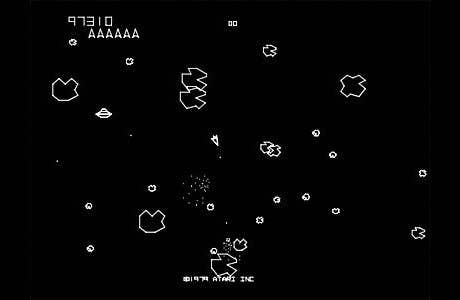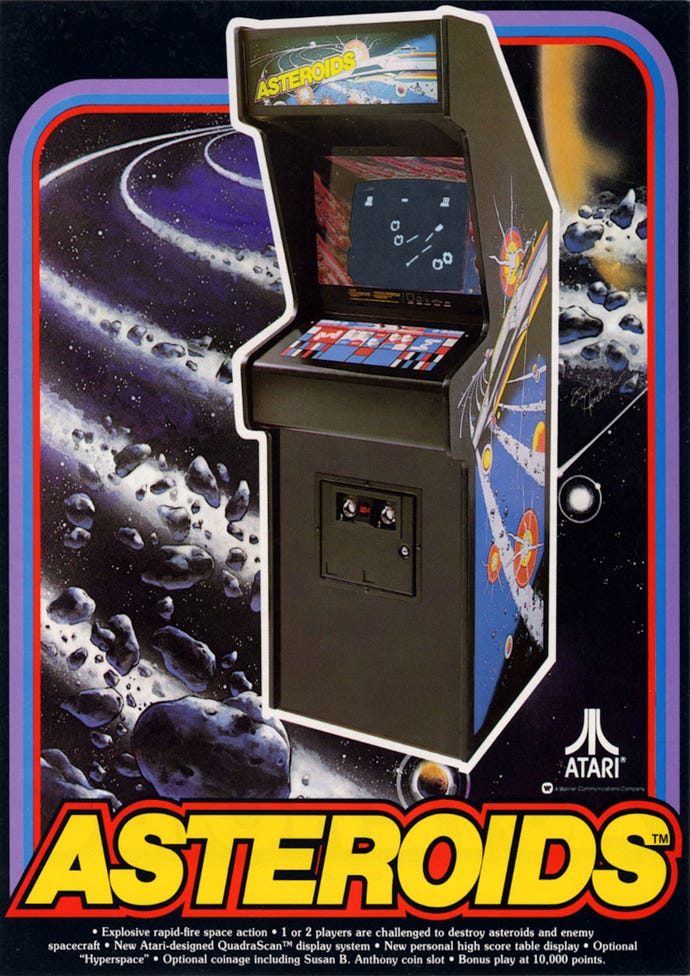The Day I Melted An Asteroids Machine
Old Man Rignall spins one of his ludicrous yarns from the olden days of gaming.
This article first appeared on USgamer, a partner publication of VG247. Some content, such as this article, has been migrated to VG247 for posterity after USgamer's closure - but it has not been edited or further vetted by the VG247 team.
During the spring of 1980, Atari's classic black and white vector graphic coin-op Asteroids became my biggest arcade obsession. In a period where most games' space ships were resolutely anchored to the bottom of the screen, Asteroids' fully rotational, free-moving craft was quite the revelation. Players had to improvise and think on their feet. Unlike the gameplay of many early Golden Age machines, Asteroids' action was unpredictable and chaotic — and when the action really heated up, nothing came close to its sheer on-screen mayhem. At least, not until Robotron 2084 came along.

The game did have a fairly high initial difficulty — mostly stemming from learning the intricacies of the ship's inertia, honing muscle memory, and, trickiest of all, learning to instantly and intuitively translate multiple rock trajectories into a series of prioritized targets and escape routes. Once you'd got that down, you and the game flowed into a seamless orgy of rock-breaking fun. The problem, though, was that the action was very intense and totally relentless — and therefore very tiring. The game would simply wear you down, no matter how good you were.
But, like almost all games, Asteroids had an Achilles heel, a design oversight that let canny gamers extend a quarter's worth of play from minutes into hours and hours — and eventually even days. It came down to this: if you took too long to clear a level, a small UFO would regularly appear from either the left or the right hand side of the screen and attempt to destroy you with some dangerously accurate shots, or simply pick off the remaining asteroids to bring an end to the level and put you back into a high-threat screen filled with yet more asteroids.
However, as long as you could avoid being shot by the UFO's fast missiles, and blew it to pieces before it could eliminate the last few remaining floating rocks left on the screen, you could stay in this far less physically demanding environment indefinitely, and in the process net yourself a neat 1000 bonus points per UFO. Better still, the average difficulty setting of the game rewarded players with an extra life for every 10,000 points scored, meaning you could earn yourself a lot of extra lives, which would carry you through the next screen once the UFO (or you) had inevitably or accidently picked off that last rock.
My method of exploitation involved continually flying up the screen, nailing UFOs almost the second they emerged. Once I got really good at doing this, I could go on almost indefinitely, racking up many, many extra lives. Something that the programmers had clearly not taken into consideration when they designed the machine. Asteroids featured a vector graphic display that was perfectly capable of drawing what at the time was a quite enormous amount of things on screen, even when the game was at its most hectic. But it did have its limitations, which I discovered on the day in question. I'd decided the previous night that I was going to try for a record score: it was a Friday, and my local arcade stayed open late, thanks to its associated night club next door. That'd give me a full 18 hours to knock up a score that I was hoping would take me well north of 10,000,000 — far higher than anyone I knew had achieved at the time.
So that day, I went to school as usual, registered myself present, and then swiftly disappeared though a door marked "fire exit" that afforded me almost full line of site coverage to a gap in the school fence and freedom. By 9:15 am I was at my favorite arcade, slipping a coin into my Asteroids machine of choice — the newer one with the minty buttons. I was the only one there, and I eased into my marathon, accompanied by period electronica being played over the arcade's PA by the cute, blue-haired girl in the cashier's booth that I had a crush on. By 10:30 am, my game was rolling, and I was on form. Slowly, but surely, my UFO-hunting tactics enabled me to rack up so many extra lives, they began to form a huge line that, as the morning turned to afternoon began to go right off the edge of the screen. As I relentlessly continued to add to that total, the machine began to chug.
The first indication that something was not quite right was the display beginning to break up, with random vector graphic lines of lightning cracking across the screen. This interference began to get progressively worse as I soldiered onwards, as did a rather nasty smell. A horrible, plastic-melting, stick-in-your-nose stench that became progressively stronger and stronger.
Then it happened. After a particularly protracted period of UFO-hunting, the final asteroid was destroyed and I started a new round. By now, it was mid-afternoon, and I was playing at the game's top level, with the maximum amount of asteroids on the screen. As I blasted them into increasingly smaller asteroids, the machine took a complete dump. The screen devolved into random ragged lines, and then went dark, and almost immediately, an acrid haze of blue-black smoke gently wafted from the vents in the back of the cabinet, quickly dispersing the small crowd that had been watching me.
I called over the arcade's mechanic, Patrick, who knew me well since I spent most of my time there, and together we pulled the machine out of the line of other coin-ops. He opened the back, and discovered that the main circuit board had completely overheated: the area around several of the chips was completely scorched, and many of the wires' plastic protective sleeves had either bubbled or melted.
Initially we both thought the machine had simply malfunctioned, but a few days later the same thing almost happened again on another machine during another Asteroids marathon, only this time I called Patrick over as the screen began to stutter, and he turned the machine off before any damage was done. At that point he put two and two together and realized what was going on. Perhaps it's the machine trying to draw all the extra lives — even the ones off the screen — or perhaps it's just some kind of number-crunching that's frying the poor old coin-op's chips, but either way, too many lives meant too many calculations for the machine, and its 8-bit brain would start to melt.
Since then, I've talked to a few other Asteroid highscorers who've experienced similar issues to the ones I did. Most have experienced vector graphic glitches when many extra lives have been earned, some have had the machine simply reset on them mid-game, and a couple cited the overheating smell. Some have racked up loads of lives with no issue. But nobody I know has actually had a full melt-down — which I think was ultimately due to the fact that it was a very hot day, and the machine was pushed right against the arcade's wall, so it had zero ventilation. I'm just glad it didn't burn the arcade down. I'd have had to go back to school.
